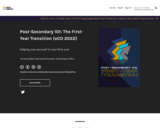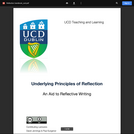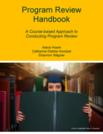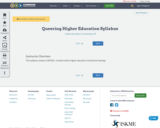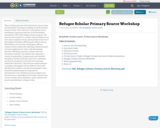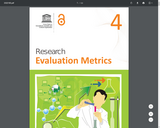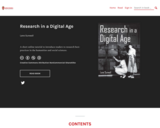This module dwells on a number of methods (including old and new) available for research evaluation. The module comprises the following four units:
Unit 1. Introduction to Research Evaluation Metrics and Related Indicators.
Unit 2. Innovations in Measuring Science and Scholarship: Analytical Tools and Indicators in Evaluation Scholarship Communications.
Unit 3. Article and Author Level Measurements, and
Unit 4. Online Citation and Reference Management Tools.
Brief overviews of the units are presented below.
Unit 1 encompassed and discussed citation analysis, use of citation-based indicators for research evaluation, common bibliometric indicators, classical bibliometric laws, author level indicators using authors' public profiles, article level metrics using altmetric tools. It is to be noted that author level indicators and article level metrics are new tools for research evaluation. Author level indicators encompasses h index, citations count, i10 index, g index, articles with citation, average citations per article, Eigenfactor score, impact points, and RG score. Article level metrics or altmetrics are based on Twitter, Facebook, Mendeley, CiteULike, and Delicious which have been discussed. All technical terms used in the Unit have been defined.
Unit 2 deals with analytical tools and indicators used in evaluating scholarly communications. The tools covered are The Web of Science, Scopus, Indian Citation Index (ICI), CiteSeerX, Google Scholar and Google Scholar Citations. Among these all the tools except Indian Citation Index (ICI) are international in scope. ICI is not very much known outside India. It is a powerful tool as far Indian scholarly literature is concerned. As Indian journals publish a sizable amount of foreign literature, the tool will be useful for foreign countries as well. The analytical products with journal performance metrics Journal Citation Reports (JCR®) has also been described. In the chapter titled New Platforms for Evaluating Scholarly Communications three websites i.e. SCImago Journal & Country Rank (SJR) [ScimagoJR.com], eigenFACTOR.org, JournalMetrics.com and one software called Publish or Perish (POP) Software have been discussed.
Article and author level measurements have been discussed in Unit 3. Author and researcher identifiers are absolutely essential for searching databases in the WWW because a name like D Singh can harbour a number of names such as Dan Singh, Dhan Singh, Dhyan Singh, Darbara Singh, Daulat Singh, Durlabh Singh and more. The ResearcherID.com, launched by Thomson Reuters, is a web-based global registry of authors and researchers that individualises each and every name. Open Researcher and Contributor ID (ORCID) is also a registry that uniquely identifies an author or researcher. Both have been discussed in this Unit. Article Level Metrics (Altmetrics) has been treated in this Unit with the discussion as to how altmetrics can be measured with Altmetric.com and ImpactStory.org. Altmetrics for Online Journals has also been touched. There are a number of academic social networks of which ResearchGate.net, Academia.edu, GetCited.org, etc. have been discussed. Regional journal networks with bibliometric indicators are also in existence. Two networks of this type such as SciELO – Scientific Electronic Library Online, and Redalyc have been dealt with.
The last unit (Unit 4) is on online citation and reference management tools. The tools discussed are Mendeley, CiteULike, Zotero, Google Scholar Library, and EndNote Basic. The features of all the management tools have been discussed with figures, tables, and text boxes.
This is Module Four of the UNESCO's Open Access Curriculum for Researchers.
Full-Text is available at http://unesdoc.unesco.org/images/0023/002322/232210E.pdf

